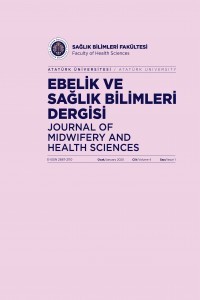Ebelerin Ebelik Mesleğine İlişkin Algıları: Bir Metafor Çalışması
Ebelik, metafor, meslek algısı
Perceptions of Midwives About the Midwifery Profession: A Metaphor Study
Midwifery, metaphor, perception of profession,
___
- Abay, Ş. E. (2017). Physician candidates’ perceptions of physician identity: A metaphor analysis sample from Hacettepe University Faculty of Medicine. Sürekli TıpEğitimi Dergisi, 26(1), 1–8.
- Akca, E., Driver, S. G., Akbaş, M., & Şenoğlu, A. (2019). The relationship between social ıntelligence levels and occupational perceptions of midwifery students. Cukurova Med J, 44(2), 621–631.
- Ay, F., Keçe, M., İnci, İ., Alkan, N., & Acar, G. (2018). Factors affecting midwifery students’ occupational perceptions and career plans. Balıkesir Sağlık Bilimleri Dergisi, 7(2), 74–82.
- Balkan, İ., & Kefe, İ. (2012). Perception and perception management from an institutional perspective. Kahramanmaraş Sütçü İmam Üniversitesi İktisadi ve İdari Bilimler Fakültesi Dergisi, 2, 19–34.
- Baskaya, Y., Sayıner, F. D., & Filiz, Z. (2020). How much do I belong to my profession? A scale development study: Midwifery Belonging Scale. Health Care for Women In, 41(8), 883–898. [CrossRef]
- Çulha Özbaş, B., & Aktekin, S. (2013). Investıgatıng prospectıve hıstory teachers’ belıefs on hıstory teachers through metaphor analysıs. Eğitimde Kuram ve Uygulama, 9(3), 211–228.
- Denat, Y., Eşer, İ., & Denat, Y. (2008). The Effect of first clinical practice on perceiving the nursing profession. Journal of Ege University Nursing Faculty, 24(1), 15–26.
- Derin, N., Şimşek Ilkım, N., & Yayan, H. (2017). Explanation of professional commitment in nurses with professional prestige. Hacettepe Üniversitesi Hemşirelik Fakültesi Dergisi, 4(3), 24–37.
- Dimitriadou, M., Papastavrou, E., Efstathiou, G., & Theodorou, M. (2015). Baccalaureate nursing students’ perceptions of learning and supervision in the clinical environment. Nursing and Health Sciences, 17(2), 236–242. [CrossRef]
- Eraslan, L. (2011). Sociological metaphors. Journal of Academic Perspective on Social Studies, 27, 1–22.
- Erişti, S. D., Uluuysal, B., & Dindar, M. (2013). Görsel algı kuramlarına dayalı etkileşimli bir öğretim ortamı tasarımı ve ortama ilişkin öğrenci görüşleri. Anadolu Journal of Educational Sciences International, 3(1), 47–66.
- Geçit, Y., & Gençer, K. (2011). Determination of geography perceptions of first year primary school teachers through metaphor (Rize University example). International Journal of Geosynthetics and Ground Engineering, 23, 1–19.
- Kale, E., & Çiçek, Ü. (2015). Nurses’ perceptions of metaphors about their profession. Journal of Health and Nursing Management, 2(3), 142–151.
- Karakul, A., Doğan, P., & Özgüven Öztornacı, B. (2022). Evaluation of pediatric nurses’ metaphor perceptions regarding their own professions. Dokuz Eylül Üniversitesi Hemşirelik Fakültesi Elektronik Dergisi, 15(1), 50–55.
- Kocabıyık, O. (2016). Olgubilim ve gömülü kuram: Bazı özellikler açısından karşılaştırma. Trakya Üniversitesi Eğitim Fakültesi Dergisi, 6(1), 55-66.
- Küçük, S., Demir, K., & Uludaşdemir, D. (2020). Determination of metaphors regarding nurse perception of hospitalized children and adolescents in the seventeen-year-old age group. Journal of Education and Research in Nursing, 17(1), 40–45.
- Molander, B. (1990). Socratic dialogue: On dialogue and discussion in the formation of knowledge. In B. Göranzon & M. Florin (Eds.). Artifical intelligence, culture and language: On education and work. The springer series on artificial intelligence and society (pp. 229–243). Springer. [CrossRef]
- Özmen, D., & Çetinkaya, A. (2016). A qualitative study on the occupational perceptions of senior nursing students. Journal of Research Development in Nursing and Midwifery, 18(1), 40–52.
- Saban, A. (2004). Metaphors of ıntroductory classroom teacher candidates regarding the concept of “teacher”. Journal of Teacher Education for Sustainability, 2(2), 131–155.
- Taşkın Yılmaz, F., Tiryaki Şen, H., & Demirkaya, F. (2014). Nurses’ and midwives’ perceptions of their professions and their expectations from the future. Health and Nursing Management Journal, 3(1), 130–113. Turkish Language Association (2011). Turkish dictionary. TDK Publications.
- Ucan Yamac, S., & Cetinkaya, E. (2021). Factors affecting the career choice of midwifery students during the COVID-19 pandemic: A qualitative study. Journal of Midwifery and Reproductive Health, 9(3), 2905–2913.
- Ulrich, S. (2004). First birth stories of student midwives: Keys to professional affective socialization. Journal of Midwifery and Women’s Health, 49(5), 390–397. [CrossRef]
- World Health Organization (WHO) (2018). Midwifery. http: //www .who. int/topics /midw ifery /en/
- Yağar, F., & Dökme, S. (2018). Planning of qualitative researches: Research questions, samples, validity and reliability. Gazi Sağlık Bilimleri Dergisi, 3(3), 1–9
- Yeşil, Y., & Apak, H. (2023). Ebelik bölümü Öğrencilerinin “Ebe” ve “Ebelik Mesleği” Kavramlarına yönelik Metaforları. Journal of Harran University Medical Faculty, 20(1), 135–142.
- Yıldırım, A., & Şimşek, H. (2013). Sosyal bilimlerde nitel araştırma yöntemleri. Seçkin Yayınları.
- Yılmaz, Ş., & Güven, G. Ö. (2021). Metaphorical perceptions of student nurses to the concept of nurse. Eurasian Journal of Health Sciences, 4(3)(3), 170–178.
- Yüzer, S., Recipient, D., & Yiğit, R. (2008). Improving the implementation of the scale of roles and functions of pediatric nurses: Reliability and validity. Journal of Atatürk University School of Nursing, 11(4), 19–29.
- Yayın Aralığı: Yılda 3 Sayı
- Başlangıç: 2018
- Yayıncı: Atatürk Üniversitesi Sağlık Bilimleri Fakültesi
Ebelik Bakımı İçin Modeller: Bir Haritalama Derlemesi
Ayberk Asena TELLİ, Zekiye KARAÇAM
Gebelikten Kaçınma Ölçeğinin Türkçe Uyarlaması: Geçerlik ve Güvenirlik Çalışması
Esra KARATAŞ OKYAY, Esra GÜNEY, Tuba UÇAR
Prenatal Dönemde Babaların Fetüse Bağlanma Düzeyi ve Bu Bağlanmayı Etkileyen Faktörler
Süreyya GÜMÜŞSOY, Sevgül DÖNMEZ, Nursel ALP DAL
Gebelikte Akılcı İlaç Kullanımı ve Etkileyen Faktörlerin Belirlenmesi
Ayşenur KAHRAMAN, Melek ŞEN AYTEKİN, Eylem METE SANDALCI, Özgür ALPARSLAN
Ebelerin Ebelik Mesleğine İlişkin Algıları: Bir Metafor Çalışması
Tuğçe SÖNMEZ, Eylem TOKER, Gülüzar SADE, Zeynep Seyyide KAYA, Seda GÜRAY
Vücudun Kilit Anahtarı: Enerji Alanı ve Duygusal Terapiler
Zeynep KARAMAN ÖZLÜ, Gülistan UYMAZ ARAS, İbrahim ÖZLÜ, Ayşegül YAYLA, Tülay KILINÇ
